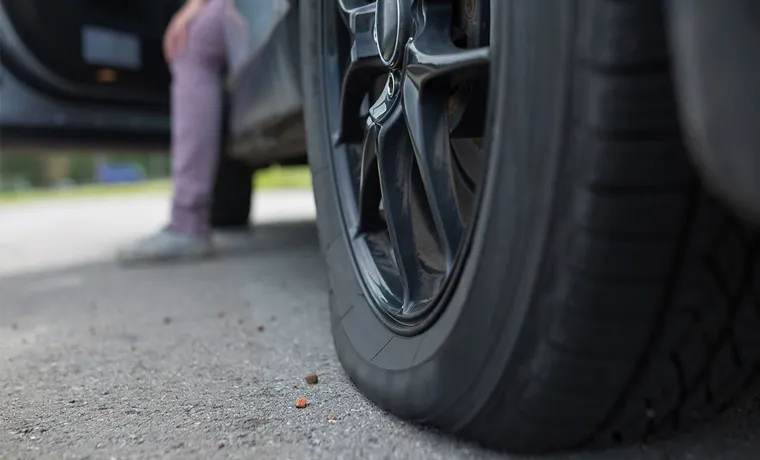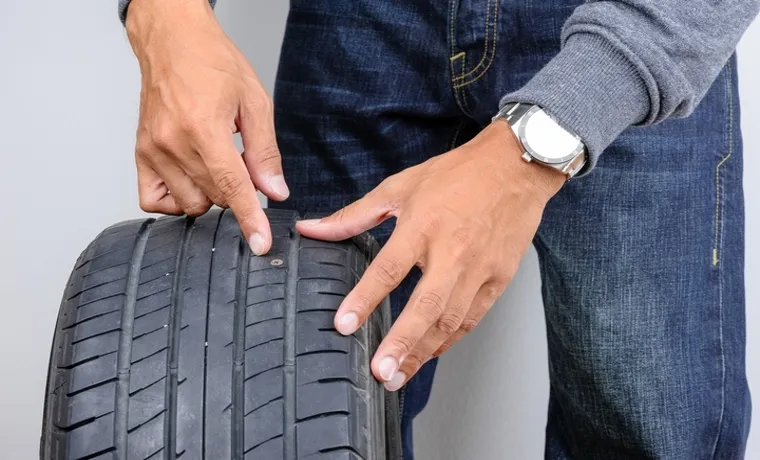Have you ever experienced a moment when you’re driving and you suddenly feel like your tire is going to fall off? It’s not uncommon to get a little worried when something like this happens. It’s a feeling that can make you panic and wonder if something is seriously wrong with your car. But why does this happen? What could be causing you to feel like your tire is about to come loose? Don’t worry, we’re going to break it down for you.
In this blog post, we’ll explore the reasons why it feels like your tire is going to fall off and what you can do to fix it. Whether you’re cruising down the highway or simply driving around town, this information will help you better understand your car and give you peace of mind while on the road. So, let’s dive in!
Table of Contents
Common Causes of Tire Wobbling
If you’ve ever felt like your tire is going to fall off while driving, it’s a sign that something is going wrong. Wheel wobbling can cause a scary and unsafe driving experience. There are many reasons why your tire might wobble.
A common cause is worn-out suspension components such as ball joints, tie rod ends. Another cause can be an out of balance wheel and tire assembly, causing the steering wheel to shake and feel wobbly. Warped brake rotors can also cause tire wobbling as they generate uneven braking.
A bent rim due to a pothole or curb strike can also result in the wheels becoming unbalanced and wobbling. It’s essential to take your vehicle immediately to a mechanic if you feel like your tire is going to fall off. Neglecting the problem can make it more severe and cause further damage.
In summary, tire wobbling is a clear indication that something isn’t right with your vehicle’s wheels, and it’s essential to take proper action right away to prevent any dangerous situations on the road.
Uneven Tire Wear
Uneven tire wear can be caused by various factors, including improper tire alignment, unbalanced tires, and worn suspension components. When the tires are not aligned correctly, they can create a wobbling motion that leads to uneven wear and tear. Unbalanced tires can also cause the car to wobble due to uneven distribution of weight.
Meanwhile, worn suspension components such as shocks and struts can result in an unstable vehicle, leading to uneven tire wear. It’s important to address these issues early on to prevent further damage and ensure your safety on the road. Regular maintenance, such as tire rotations and alignments, can also prolong the life of your tires.
With proper care and attention, you can avoid tire wobbling and ensure a smooth ride.

Wheel Alignment
Wheel Alignment One of the most common causes of tire wobbling is a misaligned wheel. When your wheels are not properly aligned, it can cause your tires to wear unevenly, which can lead to a wobbling sensation while driving. This can also cause your vehicle to pull to one side, making it difficult to drive straight.
Poor road conditions, such as potholes and uneven pavement, can also cause your wheels to become misaligned. Regular maintenance and alignment checks are important to ensure that your wheels are properly aligned, and your tires are wearing evenly, which ultimately ensures your safety while driving. By addressing any issues with wheel alignment promptly, you can avoid costly repairs and prolong the life of your tires.
So, if you’re experiencing tire wobbling or your vehicle is pulling to one side while driving, it may be time for a wheel alignment check.
Loose Lug Nuts or Bolts
Loose lug nuts or bolts are a common cause of tire wobbling. When the lug nuts or bolts on your wheels are not properly tightened, they can gradually become loose and cause your tires to wobble. The motion of the tires can loosen the lug nuts or bolts even more, creating an unsafe driving condition.
It’s important to have your lug nuts or bolts checked regularly to ensure they are properly tightened. A professional mechanic can check the tightness of your lug nuts or bolts and tighten them if necessary. It’s also important to make sure you are using the correct torque specifications when tightening your lug nuts or bolts.
Using too much torque can damage your wheels and using too little torque can cause your lug nuts or bolts to come loose. By properly maintaining your vehicle’s lug nuts or bolts, you can help prevent tire wobbling and ensure a safe driving experience.
How to Check for the Problem
It can be unsettling when you’re driving and it feels like your tire is going to fall off. There could be a few reasons why you’re experiencing this sensation. The first thing to check is the tightness of your lug nuts.
If they’re loose, it can cause your wheel to wobble and feel like it’s about to fall off. Another potential culprit is worn or damaged suspension components, such as control arms, ball joints, or tie rods. These parts play a crucial role in keeping your wheels aligned and can affect the stability of your vehicle if they’re not working properly.
Tires that are out of balance or have uneven wear can also cause vibration and the feeling that your tire is loose. If you’re experiencing any of these issues, it’s important to have your vehicle checked by a trusted technician to ensure your safety on the road.
Inspecting the Tires
Inspecting the tires of your vehicle is an important task that every driver should perform regularly. Not only will it help ensure your safety while on the road, but it will also extend the lifespan of your tires and improve fuel efficiency. The first step in checking your tires is to examine their overall condition.
Look for any visible signs of wear and tear, such as cracks, bulges, or punctures. These can be indicators of a more serious issue that could lead to a blowout or failure on the road. It’s also important to check the tire pressure, as underinflated tires can negatively impact fuel efficiency and even lead to a blowout.
An easy way to check the pressure is to use a tire gauge and compare it with the recommended pressure listed in your vehicle’s owner manual. Remember, neglecting your tires could lead to costly repairs or even put your life at risk, so always stay on top of your inspections.
Examining the Lug Nuts/Bolts
When it comes to car maintenance, one of the most important things to check is the lug nuts/bolts. These small components are what keep your tires securely attached to your car, and if they become loose or damaged, it can lead to serious accidents. So, how do you check for problems with your lug nuts/bolts? Start by visually inspecting them, looking for any signs of wear or damage.
You should also use a torque wrench to ensure that they are tightened to the manufacturer’s specifications. If you hear any strange noises or feel vibrations while driving, it’s important to have your lug nuts/bolts checked right away. Don’t wait until it’s too late – taking care of this small maintenance task can make a big difference in your car’s performance and your safety on the road.
Checking the Wheel Alignment
Checking the wheel alignment is a crucial task that can help you stay safe on the road and avoid costly repairs in the long run. So, how can you check for this problem? The easiest way is to take your car to a professional mechanic. They can use special equipment and precise measurements to determine if your wheels are properly aligned.
However, you can also perform a basic alignment check yourself. Start by checking the tire pressure and inspecting the tires for any signs of wear or damage. Then, park your car on a level surface and measure the distance between the front and back of the front tires and the back and front of the back tires.
They should be the same. If you notice any discrepancies, it may be time to take your car to a professional for a more thorough inspection. By staying alert and proactive about your wheels’ alignment, you can ensure your safety and save on costly repairs down the road.
Getting a Professional Opinion
Have you ever experienced a sensation that your tire is going to fall off while driving? It’s a scary thought, and an indication that something is not right with your car. There are several reasons why this feeling may persist, including issues with your suspension, brakes, steering, or tires. Rather than trying to diagnose the problem yourself, it’s always recommended to seek a professional opinion from a mechanic.
They can properly identify the issue and provide a solution, giving you peace of mind while on the road. It’s crucial not to ignore this feeling, as it could lead to unsafe driving conditions and potentially dangerous situations. Trust in the experts and take action to ensure the safety of yourself and others on the road.
Visiting a Mechanic
Visiting a mechanic can be nerve-wracking, especially if you aren’t car-savvy. However, consulting a professional opinion is crucial when dealing with car troubles. A mechanic can help diagnose the problem and provide you with a solution that’ll get your car back on the road.
They have the expertise to offer insights about which parts you need to repair, which fluids you need to change, and what general maintenance tasks you need to perform to keep your car running smoothly. Moreover, a skilled mechanic can help you identify potential issues that could worsen down the line and prevent you from experiencing a major breakdown. While it’s tempting to DIY, it’s worth remembering that if you tinkering with your car ends up causing more damage, it could cost you more in the long run.
In conclusion, visiting a mechanic is advisable when dealing with car problems since they provide a professional opinion and keep you safe on the road.
Signs You Need Professional Help
If you’re feeling overwhelmed and struggling to cope with your current situation, it might be time to seek professional help. Sometimes, it can be challenging to recognize these signs, but it’s essential to take action to improve your mental health. Seeking out a professional opinion can help you gain clarity and perspective on your situation, and there are many options available to suit your needs.
It’s important to remember that reaching out for help is a sign of strength, not weakness. Whether you’re dealing with anxiety, depression, relationship issues, or other challenges, there are trained professionals who can offer support and guidance. Don’t hesitate to reach out for help; it can make all the difference in your mental well-being.
Remember, it’s okay not to be okay, but it’s not okay to stay that way.
Conclusion
Well, whether you’re driving a car, a bike, or even a unicycle, the fear of a tire falling off can be unnerving. But fear not, for the answer to why it feels like your tire is going to fall off is simple: it’s all in your head..
.and your suspension, and your alignment, and your tire pressure, and your wheel bearings, and a dozen other factors that can affect your vehicle’s stability. So, if you’re feeling a bit wobbly on the road, take a deep breath, check your equipment, and remember that the only thing truly falling off right now is your fear.
“
FAQs
Why does my car shake and vibrate when I’m driving?
There could be several reasons why your car is shaking while driving, including problems with the wheel alignment, tire balance, or suspension systems. It’s best to take your car to a professional mechanic to properly diagnose and fix the issue.
How do I know if my tire is about to fall off?
Signs that your tire may be about to fall off can include loud noise or vibration coming from the wheels, loose or wobbly lug nuts, or uneven tire wear. If you notice any of these warning signs, it’s important to have your car inspected and repaired immediately to avoid a potential accident.
Can a bad wheel alignment cause my tire to feel loose or wobbly?
Yes, a bad wheel alignment can cause your tire to feel loose or wobbly. When your wheels are not properly aligned, they can cause your tire to wear unevenly and create a shaky or vibrating sensation. Make sure to have your car’s alignment checked regularly to avoid these issues.
How do I ensure that my lug nuts are properly tightened?
To ensure that your lug nuts are properly tightened, you can use a torque wrench to tighten them to the manufacturer’s specifications. It’s important to follow the instructions in your car’s manual and torque the nuts in a star pattern to evenly distribute the pressure.
Can driving on a flat tire cause damage to my car’s suspension system?
Yes, driving on a flat tire can cause damage to your car’s suspension system, as well as the tire itself. It’s important to stop driving as soon as you notice a flat tire and have it repaired or replaced immediately to avoid further damage to your vehicle.
What are some common causes of tire wear and tear?
Common causes of tire wear and tear can include driving on rough roads, mismatched tire types, improper inflation, or overloading your vehicle. To prolong the life of your tires, make sure to rotate them regularly and maintain proper inflation levels.
How often should I have my tires balanced and rotated?
It’s recommended to have your tires balanced and rotated every 5,000 to 7,500 miles to ensure even wear and tear. Make sure to follow your car’s manual and have your tires professionally serviced to avoid potential issues with your vehicle.



